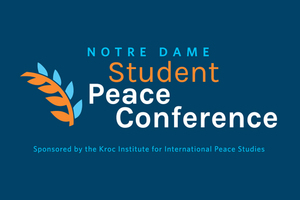
After five years of being primarily online, the 2023 Notre Dame Student Peace Conference returned to its former glory this spring, bringing together students from around the world to share their passion for peace studies.
The conference, a signature event of the University of Notre Dame’s Kroc Institute for International Peace Studies, is an annual gathering organized by students and for students. Its mission is to provide space for undergraduate and graduate students to dialogue about peacebuilding, social justice and conflict transformation.
Students within the United States were encouraged to attend on site, while registrants from outside the continental U.S. could attend virtually. The net result was a conference that attracted more than 120 participants from 27 colleges and universities representing more than 15 countries around the globe: Armenia, Canada, China, Colombia, England, Egypt, Germany, India, Kenya, Nigeria, Northern Ireland, Pakistan, Uganda, the United States, and Venezuela.
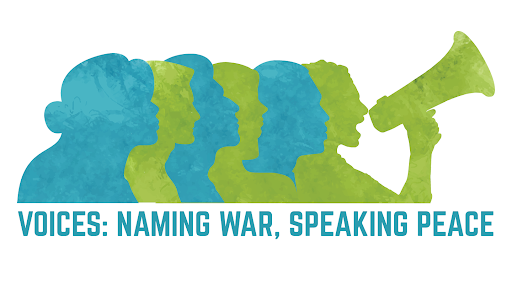
Anna Van Overberge, assistant director, academic administration and undergraduate studies, worked closely with this year’s student organizers through all phases of planning. “I was impressed with how they developed as leaders during the planning process. We had good attendance and a great schedule with really strong presentations,” she said.
This year’s event was organized around the theme, “Voices: Naming War, Speaking Peace,” and was inspired by the 2022-2023 Notre Dame Forum theme of War & Peace. Conference sessions took place April 14 and 15 and were planned by co-chairs Jennifer (Jenn) Eburuoh (B.A. ‘23), environmental sciences and global affairs-peace studies major, and Allison Doctor (B.A. ‘23), Spanish language and literature and global affairs-peace studies major.
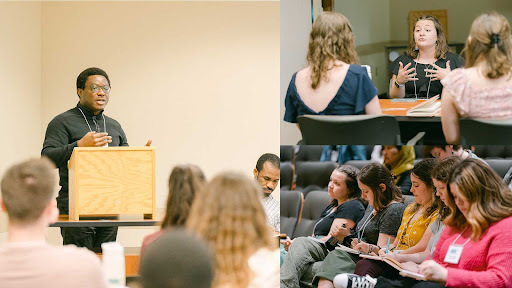
“The content was diverse,” said Eburuoh. “We had participants from a variety of fields, which gave way to rich, comparative discussions.”
Added Doctor, “It was valuable to be able to connect on a different level and interact with students and faculty we normally wouldn’t have the opportunity to engage with – not only Notre Dame affiliates, but students from other universities and programs across the globe.”
The schedule featured 28 sessions led by 33 presenters on topics ranging from restorative justice to the Russia-Ukraine conflict, indigenous peacebuilding, the settler colonial paradigm in the context of Palestine/Israel, women’s participation in peace processes, building solidarity through shared histories, climate change, and Catholic peacebuilding.
This year’s keynote was a virtual address from Sara Cobb, Drucie French Cumbie Chair at the Carter School for Peace and Conflict Resolution at George Mason University, entitled “Narrative Approaches to Peacebuilding: A Practical Theory.”
“Narrative legitimacy is at the heart of all conflict,” Cobb said. “People struggle to be framed by others as legitimate and appropriate, and when they aren’t, or they are left out, they don’t get a voice.”
She highlighted how marginalized people are already depicted in ways that are negative, and that because of this, they often “don’t make it to the table because they are historically described by others as not counting.”
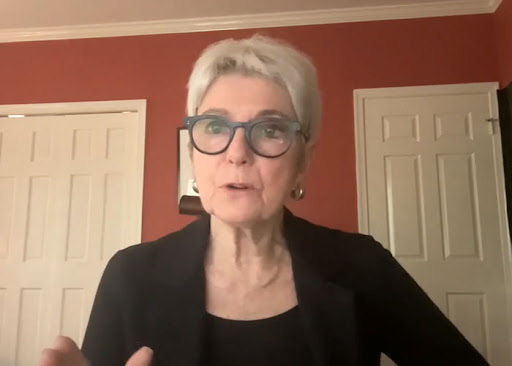
“Dr. Cobb introduced some heavy academic concepts and made them really tangible, no matter what background you are from,” said Doctor. “To be able to use the tools she introduced to start a conversation about peace studies with a family member, relative or someone you meet on the street makes Dr. Cobb’s lecture broadly applicable.”
Eburuoh agreed, adding that “Dr. Cobb had so much experience to share. She presented her lecture in an engaging way with many case studies and examples from her decades of experience.”
This year’s conference also featured digital versions of Notre Dame MFA student art exhibits on display at the South Bend Museum of Art. Grace Hamilton’s project was a poster series highlighting the experiences of featured guests on the Design is Not Neutral podcast. The podcast investigates how a feminist approach can be used to develop anti-patriarchal and anti-capitalist design pedagogy. Geneva Hutchinson’s project, “RESTORE/RECLAIM,” was a response to her upbringing as a southern, Christian, pastor’s daughter. Her exhibit explores the complexities of being raised within purity culture, healing from sexual trauma, and responding to spiritual and physical abuse within the church.
“Seeing the transformation of our ideas from the initial planning stages last September into a physical event that brought so many people together, enabling them to build connections and get to know other fields of studies, was very rewarding,” said Eburuoh.
“It has been fun to see all the new friendships and connections that were made,” echoed Doctor. “Bringing the conference to life was very special.”
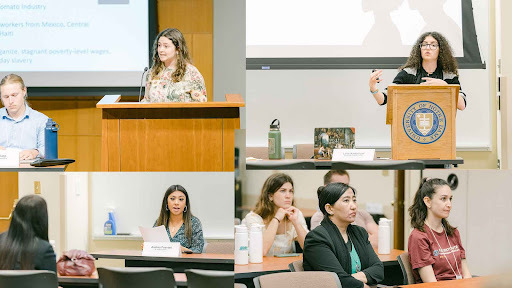
About the Kroc Institute: Notre Dame’s Kroc Institute, part of the Keough School of Global Affairs, is one of the world’s principal centers for the study of causes of violent conflict and strategies for sustainable peace.